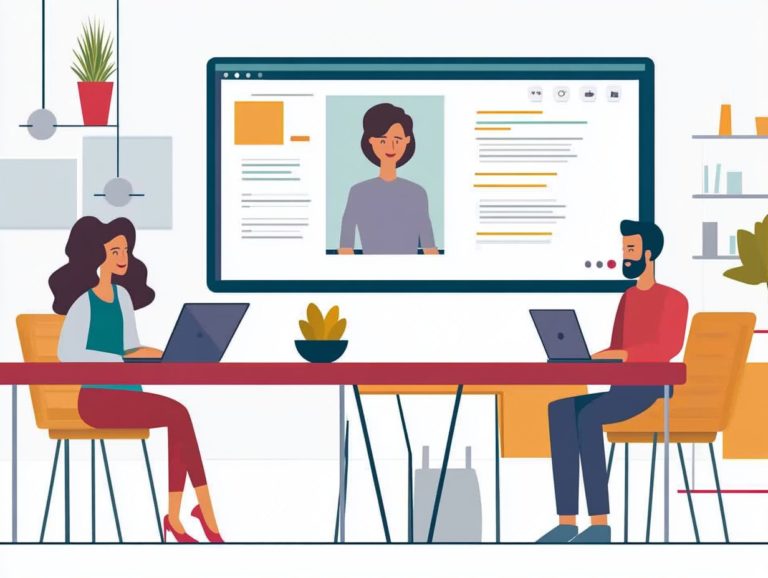E-Learning Success Stories from Top Corporations
In today s fast-paced business environment, e-learning stands out as a transformative tool for corporate training and development.
This article delves into the myriad benefits e-learning brings to corporations think cost savings, enhanced efficiency, and improved employee engagement and retention. It showcases successful implementations in leading organizations through compelling case studies. It uncovers key strategies for crafting effective and engaging content and offers a glimpse into the emerging technologies poised to shape the future of corporate learning.
Don t miss out! Discover how e-learning can transform your training approach today!
Contents
- Key Takeaways:
- Benefits of E-Learning for Corporations
- Successful E-Learning Implementations in Top Corporations
- Key Strategies for E-Learning Success
- Future of E-Learning in Corporations
- Frequently Asked Questions
- Can you give examples of successful e-learning in major companies?
- How has e-learning impacted employee performance and productivity at top corporations?
- What benefits have top corporations seen from implementing e-learning?
- Are there any challenges that top corporations have faced in implementing e-learning?
- How do top corporations ensure the success of their e-learning programs?
- Can e-learning be used for all types of training and development at top corporations?
Key Takeaways:

- E-Learning can save your company money while boosting efficiency.
- Engaging employees through e-learning can lead to better retention and performance.
- Creating effective, interactive content is essential for e-learning success in corporations.
Definition and Importance
Rapid eLearning is a fast way to create online training courses that streamline the development of eLearning materials. This approach enables organizations like yours to meet training requirements with remarkable efficiency.
It prioritizes quick turnaround times while maintaining a commitment to quality, positioning it as a vital asset in the realm of corporate training.
By harnessing the latest technology and innovative design principles, you can effectively tackle common training challenges such as time constraints and budget limitations.
This approach integrates seamlessly with blended training methods, combining online and face-to-face interactions to cultivate a more comprehensive learning experience.
The impact on your organization can be substantial. Rapid eLearning not only elevates employee performance through engaging and relevant content but also equips your company to swiftly respond to market demands.
In today s fast-paced business landscape, this adaptability is essential. Effective course design can lead to enhanced skills and knowledge retention, ultimately propelling your organization toward greater success.
Benefits of E-Learning for Corporations
E-Learning presents an array of advantages for corporations, including substantial cost savings, heightened efficiency in training processes, and improved performance support for employees.
By harnessing online training solutions, you can effectively meet various training needs while simultaneously nurturing business growth.
Cost Savings and Increased Efficiency
One of the most compelling advantages of eLearning is its remarkable potential for cost savings and increased efficiency. This enables you to optimize training materials and minimize the human hours spent on course development, ultimately shortening project durations.
By reducing the need for travel and accommodation, your organization can allocate budgets more strategically, directing resources towards enhancing the quality of instructional materials.
eLearning streamlines the content delivery process, allowing learners to access training modules at their convenience and engage with the material at their own pace.
This flexibility not only caters to diverse learning styles but also significantly reduces instructional expenses. As a result, your company becomes better equipped to manage project timelines effectively, ensuring timely completion while cultivating a more engaged workforce that thrives on tailored training experiences.
Start implementing e-learning today to see immediate benefits!
Improved Employee Engagement and Retention

Enhanced employee engagement and retention are significant advantages of eLearning. Online learning platforms offer interactive content that resonates with various learner preferences, boosting user engagement.
You can address individual learning styles by integrating personalized online learning experiences, which fosters a more inclusive environment. This tailored approach, complemented by game-based learning elements using games to make learning more engaging transforms training into an enjoyable experience! It also drives knowledge retention. When employees feel genuinely invested in their learning journey, their job satisfaction tends to soar, cultivating a culture of continuous improvement.
Implementing a well-developed curriculum that aligns with learning expectations amplifies effectiveness and keeps employees motivated to grow within the company. This, in turn, significantly reduces turnover rates.
Successful E-Learning Implementations in Top Corporations
Successful eLearning implementations in leading corporations highlight the power of customized training solutions. Organizations like CommLab India leverage case studies to exemplify best practices in corporate training, addressing the challenges of e-learning in corporate settings and demonstrating the tangible benefits of tailored approaches for enhanced learning outcomes.
Case Studies and Examples
Case studies and examples of e-learning: bridging knowledge gaps in corporations provide invaluable insights into the effectiveness of various instructional strategies and performance assets used by organizations.
These real-world scenarios illustrate how customized training solutions tackle the common challenges businesses face today. By examining specific implementations, you can observe measurable outcomes, such as improved employee retention rates and enhanced skill acquisition.
Detailed feedback from participants gives a glimpse into their learning experiences, showcasing notable increases in engagement and satisfaction.
The overall performance metrics reveal the return on investment for companies that adopt innovative instructional designs. Some organizations have optimized their training processes, leading to more effective onboarding and continuous development initiatives demonstrating that eLearning is essential in modern corporate training strategies.
Key Strategies for E-Learning Success
- Craft effective course design
- Leverage advanced learning technologies
- Consistently update content to align with evolving training needs
Effective Content Creation and Delivery

Effective content creation and delivery are essential elements of successful eLearning courses, ensuring you receive high-quality training that is both engaging and tailored to your performance support needs.
By employing responsive design techniques, content adapts effortlessly across various devices, enhancing accessibility and usability.
Interactive features, such as quizzes, simulations, and branching scenarios, invite active engagement, making your learning experience more memorable.
Incorporating multimedia resources, such as videos, infographics, and animations, caters to diverse learning styles and enriches the educational experience.
It’s vital for course designers to align instructional materials with your specific requirements, ensuring the content meets and anticipates your performance support needs.
Engaging and Interactive Learning Methods
Engaging learning methods, such as game-based learning and immersive language experiences, are essential for online education.
These approaches grab your attention and encourage active participation. This allows you to immerse yourself in the material.
By incorporating elements like quizzes, simulations, and collaborative projects, educators can create a vibrant sense of community and motivation among participants.
When these strategies are woven into eLearning courses, they elevate traditional lessons into captivating narratives, enabling you to apply your knowledge in real-world settings.
This dynamic interplay enriches your learning experience, making knowledge retention not just effective but genuinely enjoyable. Ultimately, this fosters a deeper understanding and a more committed approach to your studies.
Future of E-Learning in Corporations
The future of eLearning in corporations is set for a remarkable transformation, influenced by emerging technologies and trends.
You ll find mobile learning taking center stage, along with innovative advancements in digital marketing strategies designed to elevate training delivery.
Companies should adopt these e-learning strategies to stay competitive.
Emerging Technologies and Trends
Emerging technologies and trends are revolutionizing the eLearning landscape. They introduce innovative online training methodologies and corporate training strategies that elevate the learner experience.
These advances especially in artificial intelligence, augmented reality, and learning analytics are fundamentally changing how you approach education and skill development within your organization.
AI can personalize learning paths, tailoring content to fit individual needs and learning speeds. This fosters deeper engagement among your learners.
Augmented reality takes this a step further by immersing users in interactive scenarios that mimic real-world challenges. This transforms training into a dynamic and effective experience.
Meanwhile, learning analytics refers to the analysis of data concerning learners and their contexts. It provides insights that help improve training programs.
Collectively, these technologies create a robust framework that significantly enhances knowledge retention and application in corporate settings. This paves the way for a more skilled and adaptable workforce.
Frequently Asked Questions

Can you give examples of successful e-learning in major companies?
Some successful e-learning initiatives in top corporations include IBM’s “Think Academy,” which has trained over 50,000 employees, GE’s “Crotonville,” which has been used for leadership development for over 60 years, and McDonald’s “Hamburger University.” For insights on the future of e-learning in corporate training, it’s noteworthy that “Hamburger University” has trained over 275,000 employees worldwide.
How has e-learning impacted employee performance and productivity at top corporations?
Studies have shown that e-learning has led to improved employee performance and productivity at top corporations. For example, IBM reported a 50% decrease in time to market for new products after implementing e-learning, while Cisco reported a 47% increase in employee productivity.
What benefits have top corporations seen from implementing e-learning?
E-learning has provided many benefits for top corporations, including cost savings on training materials and facilities, increased accessibility and flexibility for employees, and improved knowledge retention and application.
Are there any challenges that top corporations have faced in implementing e-learning?
While e-learning has been successful for many top corporations, there have been some challenges in the implementation process. These include resistance to change from employees, technical issues with the e-learning platform, and ensuring the quality and effectiveness of the training materials.
How do top corporations ensure the success of their e-learning programs?
Top corporations ensure the success of their e-learning programs by setting clear goals and objectives, identifying the right e-learning platform and content, providing support and resources for employees, and regularly evaluating and updating the program based on feedback and results.
Can e-learning be used for all types of training and development at top corporations?
Yes, e-learning can address many training needs at top corporations. This includes onboarding, leadership development, compliance training, and technical skills training.
It can also complement other training methods. This creates a more comprehensive learning experience. Embracing e-learning can be a game-changer for corporate training!






